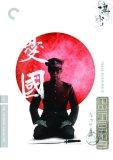| Reviews & Columns |
|
Reviews DVD TV on DVD Blu-ray 4K UHD International DVDs In Theaters Reviews by Studio Video Games Features Collector Series DVDs Easter Egg Database Interviews DVD Talk Radio Feature Articles Columns Anime Talk DVD Savant Horror DVDs The M.O.D. Squad Art House HD Talk Silent DVD
|
DVD Talk Forum |
|
|
| Resources |
|
DVD Price Search Customer Service #'s RCE Info Links |
|
Columns
|
|
|
Patriotism - Criterion Collection
I recently reviewed Wagner's Tristan und Isolde for DVD Talk, and mentioned the bizarre German fascination linking love with death, perhaps best exemplified by Wagner's own "Liebestod," (Love-death) written for that opera. Imagine my surprise, then, to hear Wagner's elegy bursting forth from Patriotism, a Japanese art film by author and playwright Yukio Mishima. And yet it made and makes perfect sense--Mishima was a man entranced by death, especially death as a result of ritual suicide, too often mischaracterized by Westerners as hara-kiri, when Mishima and other purists preferred the term seppuku. Patriotism is most likely a film that will appeal to a select few interested in Mishima the man, but the good news is it deals with its thesis in a mere 27 minutes while Wagner's opera takes hours to unfold.
Patriotism is, for all intents and purposes, a silent film with an added orchestral soundtrack. It is told in epigrammatic segments interspersed with long, detailed interstitial expository texts. The black and white feature has only two actors, Mishima himself as an army lieutenant, a member of the Imperial Guard who has been secretly involved in a coup which has failed. The Emperor has decreed that the lieutenant's cohorts be executed and the lieutenant himself has been appointed that task. Unable to disgrace himself and his friends that way, he has decided ritual suicide is the only way out. He is supported fully in that decision by his new wife Reiko, played by the lovely Yoshiko Tsuruoka.
The film is simply the depiction of the couple's last evening together, one consisting of long langorous looks at each other leading to lovemaking, and then their successive deaths. It doesn't sound like much, but Patriotism casts an almost dreamlike spell that is not easily forgotten. As strange as it may sound, though this film is played in kabuki style as if in a Japanese N'oh performance, and with Wagner's music blaring from the soundtrack, Patriotism reminded me most of two of Alain Resnais' masterpieces, Hiroshima, Mon Amour and Last Year at Marienbad. Patriotism shares Resnais' love of beautifully arranged tableaux with little if any action, with a similar doting love of the human form in close-up. Mishima, directing as well as starring and writing (in the only film he ever made), obviously had full control on the very minimalist style presented here, and it works in often unexpected ways. Note, for instance, how Mishima's eyes are never seen throughout the film, lending his character an almost inhuman and certainly dissociative presence.
The death scenes, Mishima's especially, are horrifyingly graphic and, matching Wagner's music, completely operatic. Mishima spent a life fascinated by suicide (his first novel "Tozuko" featured suicide as a major plot element), and of course he is probably best known to westerners for his own ritual suicide in 1970, after, as is perhaps presciently portrayed in Patriotism, an abortive attempt at a coup. After Mishima's death, his widow had all prints of the film recalled and destroyed and the film was presumed lost in the intervening decades. The negative was evidently saved and recently resurfaced, and Criterion has released the film on DVD for the first time, making it available for a new generation. With Paul Schrader's biopic Mishima (which contains a segment on the making of Patriotism) about to be released by Criterion, this release will serve as a fascinating companion piece.
The DVD
Video:
This 1.33:1 black and white transfer is generally sharp, though it is plagued by omnipresent (if slight) flicker and some softness and contrast issues. There is virtually no dirt or debris, however.
Sound:
The mono soundtrack unfortunately is full of clicks, pops and hisses, making it distracting at times. Since the film is silent, I recommend putting on a CD of Wagner's "Liebestod" and letting the film play--you'll get pretty much the same effect.
Extras:
As usual, Criterion comes through with some sterling extras. The film is available with both Japanese and English intertitles--and it's interesting to note that the English version runs a couple of minutes longer as a result. There is a great 50 minute Making Of documentary where most of the production crew is reunited 40 years after the film was made in order to reminisce about the production and Mishima himself. Of most interest to Mishima fans are an audio recording of Mishima at the Foreign Correspondents Club of Japan as well as excerpts from an interview where Mishima discusses his ideas about death. Of most interest to me personally was the extensive booklet included, which features an excellent essay by Tony Rayns, a fascinating in-depth piece by Mishima himself on the film's production, as well as the original Mishima short story on which the film is based.
Final Thoughts:
Patriotism is most certainly a cult item. If you've heard of Mishima and been interested to learn more, this release in conjunction with Schrader's Mishima will give you an in-depth introduction. Recommended.
____________________________________________
"G-d made stars galore" & "Hey, what kind of a crappy fortune is this?" ZMK, modern prophet
|
| Popular Reviews |
| Sponsored Links |
|
|
| Sponsored Links |
|
|
| Release List | Reviews | Shop | Newsletter | Forum | DVD Giveaways | Blu-Ray | Advertise |
|
Copyright 2024 DVDTalk.com All Rights Reserved. Legal Info, Privacy Policy, Terms of Use,
Manage Preferences,
Your Privacy Choices | |||||||














